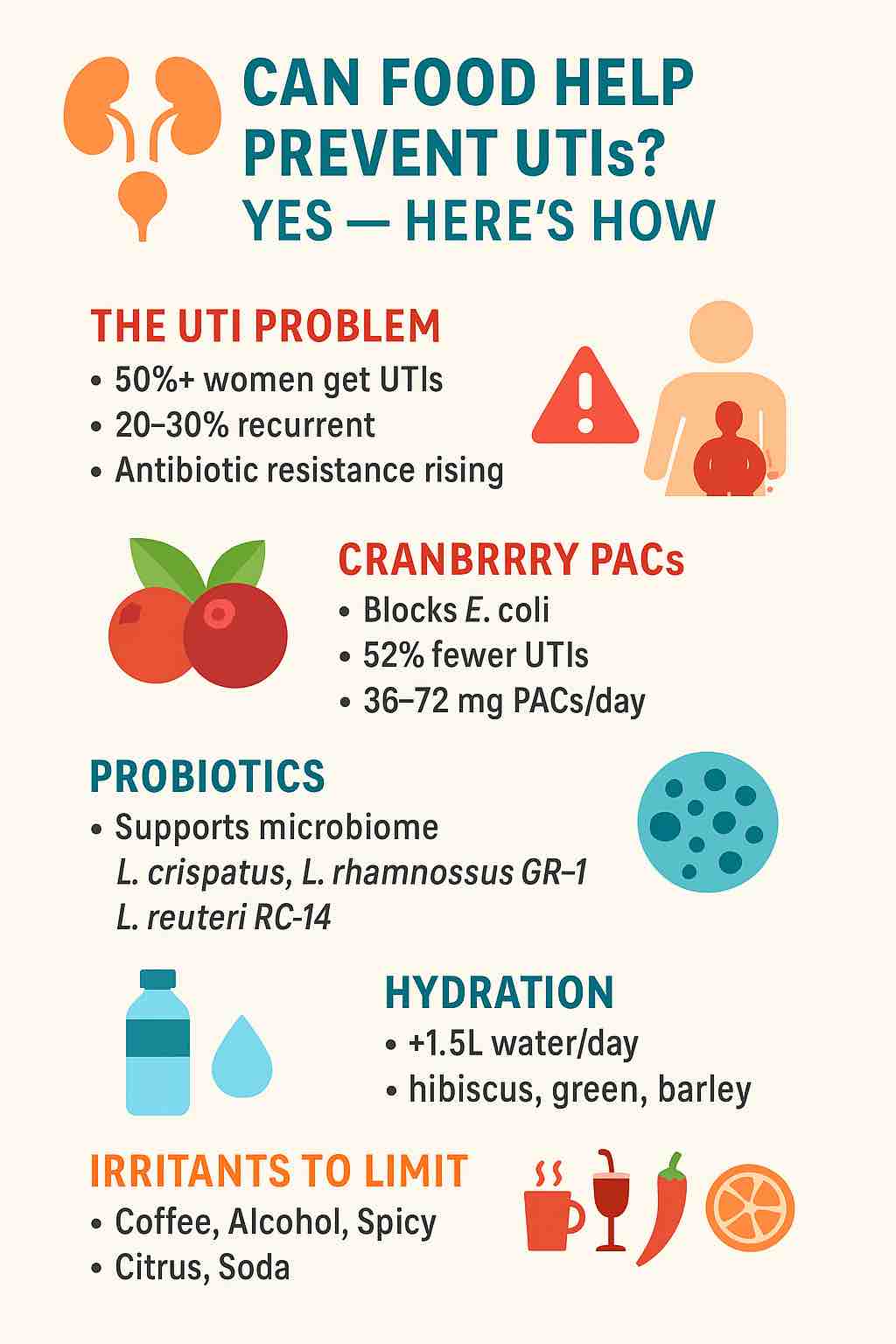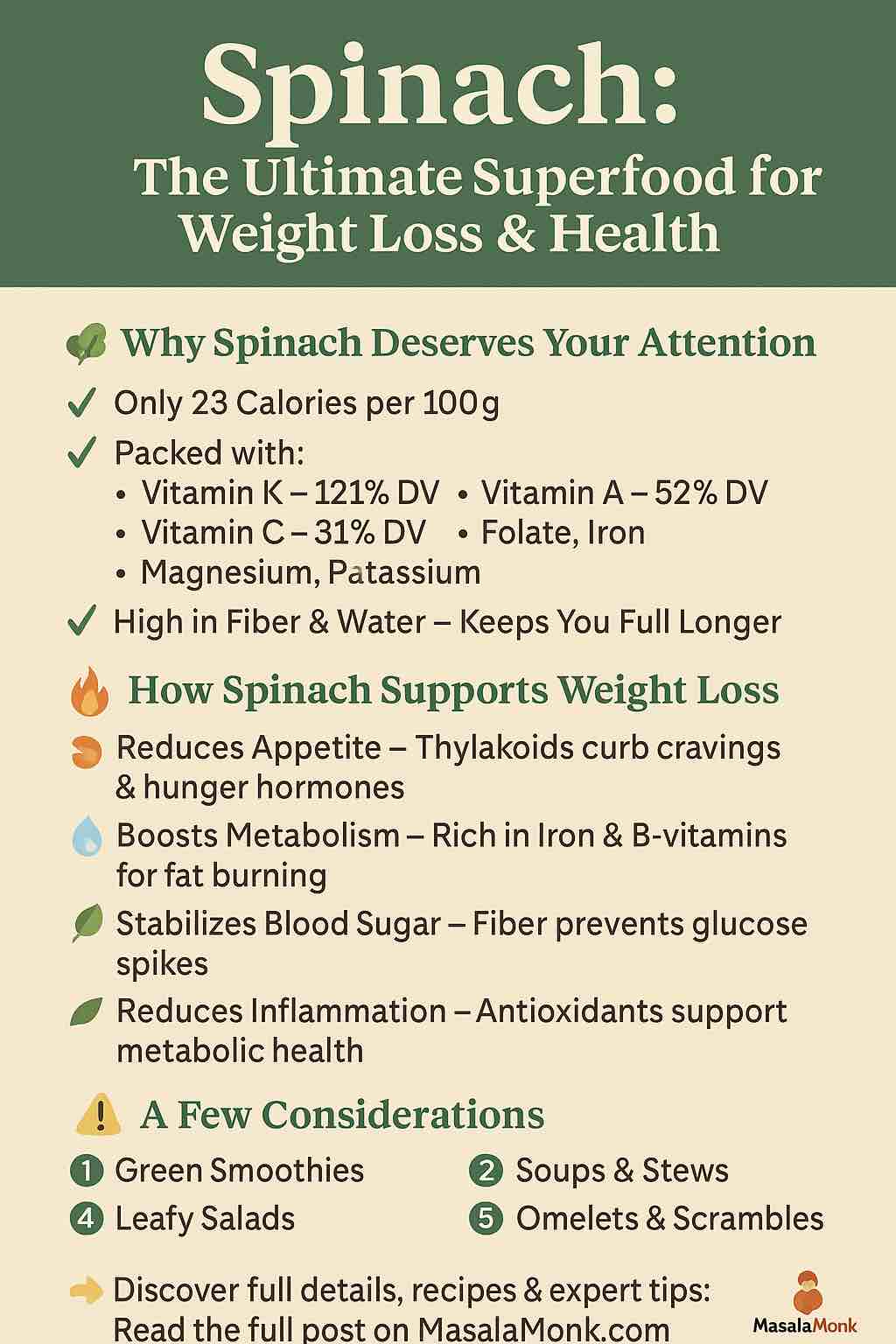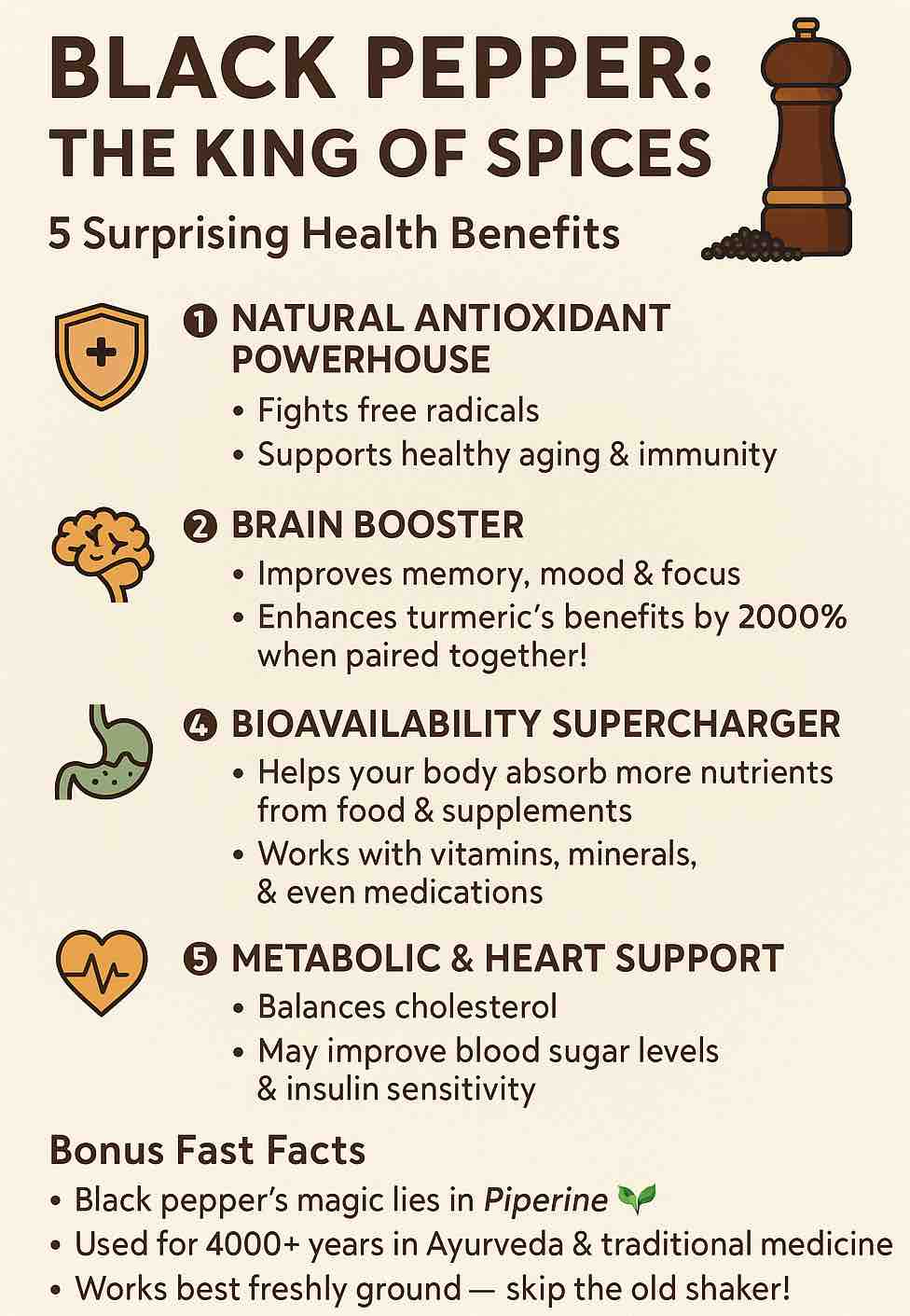
Urinary Tract Infections are deceptively simple yet incredibly frustrating. More than 50% of women will experience at least one UTI in their lifetime, and 20-30% will face recurrent episodes. While antibiotics work for acute infections, overreliance fuels rising antibiotic resistance, potential gut dysbiosis, and leaves many patients caught in a vicious cycle.
Today, nutrition science, microbiome research, and clinical trials are opening new doors. What you eat and drink can influence:
- The adhesion of bacteria like E. coli in the bladder
- The strength of your immune response
- The resilience of your vaginal and gut microbiome
- The inflammatory state of your bladder lining
This guide combines cutting-edge research, practical dietary advice, and holistic strategies to empower you.
🔬 The Microbiology of UTIs: Setting the Stage
To fully appreciate how food helps, we need to understand how infections take hold.
- 90% of uncomplicated UTIs are caused by uropathogenic Escherichia coli (UPEC).
- UPEC attaches to the bladder lining via fimbriae (hair-like structures) and forms biofilms, making them harder to flush or kill.
- Other pathogens include Klebsiella, Enterococcus, Proteus, and Staphylococcus saprophyticus.
- Women are more prone due to a shorter urethra, hormonal factors, and anatomical proximity to the rectum.
👉 Disrupting adhesion and biofilm formation is one of the key ways foods like cranberries, probiotics, and certain teas exert their protective effects.
🍒 The Star Player: Cranberries and Their Powerhouse Compounds
What’s in Cranberries?
- Proanthocyanidins (PACs) – specifically A-type PACs, unique to cranberries.
- Flavonoids & Polyphenols – antioxidant, anti-inflammatory.
- Quinic Acid – contributes to urinary acidity, creating an unfavorable environment for bacteria.
Latest Evidence: 2025 Highlights
- ✅ RCT on Pacran™ (500 mg daily, 6 months): 52% fewer culture-confirmed UTIs.
- ✅ Meta-analysis (50 studies): Meaningful reductions in recurrence, particularly in women with frequent UTIs.
- ✅ Mechanism: PACs physically prevent E. coli fimbriae from latching onto bladder cells.
Bioavailability Matters
- PACs are poorly absorbed into the bloodstream but act directly within the urinary tract.
- Many commercial juices lack therapeutic PAC levels due to dilution and processing.
How Much Cranberry Is Enough?
| Product | PAC Content | Dosage |
|---|---|---|
| Pure cranberry juice (unsweetened) | ~36 mg per 240 ml | 1-2 servings daily |
| Cranberry capsules (standardized) | 36-72 mg PACs | 1-2 capsules daily |
| Cranberry tea | Variable | Daily routine |
⚠ Note: Sweetened cranberry cocktails offer little benefit and add unnecessary sugars, potentially feeding harmful bacteria.
🧬 Probiotics: Restoring the Microbial Defense
Our body has natural “good bacteria” that help maintain urinary health. Disruptions (from antibiotics, stress, poor diet) can allow bad bacteria to flourish.
Vaginal Microbiome Defense
- Healthy vaginal flora dominated by Lactobacillus crispatus and Lactobacillus jensenii lowers pH, produces hydrogen peroxide, and inhibits pathogens.
- Women with depleted vaginal lactobacilli have higher UTI rates.
Gut Microbiome Link
- Gut dysbiosis can increase fecal shedding of UPEC, raising UTI risk.
Probiotic Research
- Some small studies show up to 50% fewer recurrences with oral or vaginal probiotics.
- Optimal strains include: L. crispatus, L. rhamnosus GR-1, L. reuteri RC-14.
Food Sources of Probiotics
- Plain yogurt (unsweetened, live cultures)
- Kefir
- Kimchi, sauerkraut
- Miso, natto, tempeh
Probiotic Supplements
- Look for refrigerated capsules with at least 10 billion CFUs.
- Vaginal probiotics may offer direct urinary benefits for some women.
💧 Hydration: The Simplest, Cheapest, Overlooked Tool
One 2018 clinical trial showed that increasing fluid intake by 1.5 liters daily reduced recurrent UTIs by 50%.
- Hydration promotes frequent urination, flushing bacteria before they can adhere.
- Dehydration concentrates urine, creating an environment for bacterial growth.
Smart Hydration Options
- Water (best)
- Hibiscus tea
- Weak green tea
- Unsweetened barley water
- Watermelon juice
- Coconut water
Avoid:
- Highly sweetened drinks
- Caffeinated energy drinks
- Sugary sodas
🌿 Plant Allies Beyond Cranberries
🍵 Green Tea
- Catechins inhibit bacterial growth.
- Anti-inflammatory.
- Potential mild diuretic.
🌺 Hibiscus Tea
- Contains hibiscus acid with antimicrobial properties.
- In one study, elderly catheterized patients saw 36% fewer UTIs.
🧄 Garlic
- Contains allicin, a potent antimicrobial shown to inhibit E. coli in vitro.
- Can be used in cooking or as aged garlic extract.
🌿 Dandelion & Parsley
- Mild natural diuretics, sometimes included in “bladder cleanse” teas.
🚫 Dietary Irritants to Minimize
During active infection or high-risk periods, reducing bladder irritants may help:
| Food | Why Avoid? |
|---|---|
| Coffee & Caffeine | Bladder stimulant, worsens urgency |
| Alcohol | Dehydration, bladder irritant |
| Spicy Foods | Heightens inflammation |
| Artificial Sweeteners | Linked to bladder discomfort |
| Carbonated Drinks | Gas, acidity |
| High Sugar | May feed bacteria |
| Citrus Fruits | Acidic, can irritate sensitive bladders |
⚠ Not everyone reacts the same. Keeping a bladder diary helps identify personal triggers.
💊 Non-Food Interventions (That Pair Well with Nutrition)
1️⃣ Methenamine Hippurate
- Converts to formaldehyde in acidic urine.
- Prevents bacterial growth, very effective for recurrent UTIs.
- Equal efficacy to antibiotics in recent large trials.
2️⃣ Uromune (MV-140)
- Sublingual vaccine exposing immune system to inactivated UTI bacteria.
- Shown to reduce recurrences by up to 70% in early studies.
- Limited availability; still under regulatory review in many countries.
3️⃣ d-Mannose
- Popular sugar thought to block E. coli adhesion.
- Recent 2024 JAMA study found no significant benefit vs placebo.
- May help select patients, but not strongly recommended as first-line.
⚖ Integrating Lifestyle, Nutrition & Medical Care
| Prevention Strategy | Evidence Strength |
|---|---|
| Hydration | ⭐⭐⭐⭐⭐ |
| Cranberry PACs | ⭐⭐⭐⭐ |
| Probiotics | ⭐⭐⭐ |
| Avoiding bladder irritants | ⭐⭐⭐ |
| Methenamine Hippurate | ⭐⭐⭐⭐⭐ |
| Uromune Vaccine | ⭐⭐⭐⭐ |
| d-Mannose | ⭐⭐ |
Always involve your doctor when:
- You have multiple UTIs yearly.
- UTIs are associated with fever, kidney pain, or systemic symptoms.
- You are pregnant, diabetic, or immunocompromised.
📅 Enhanced 3-Day Food Plan for UTI Prevention
Day 1
- Breakfast: Kefir with chia seeds & blueberries
- Mid-Morning: Parsley tea + handful almonds
- Lunch: Grilled salmon, steamed broccoli, quinoa
- Snack: Hibiscus iced tea + Greek yogurt
- Dinner: Garlic-lemon chicken, roasted sweet potatoes, asparagus
- Before bed: Cranberry PAC supplement
Day 2
- Breakfast: Oatmeal with ground flaxseed & kiwi
- Mid-Morning: Coconut water
- Lunch: Lentil soup, whole-grain bread, cucumber salad
- Snack: Watermelon cubes, green tea
- Dinner: Stir-fried tofu with garlic, ginger & bok choy
- Before bed: Plain yogurt + probiotic capsule
Day 3
- Breakfast: Scrambled eggs with spinach and avocado
- Mid-Morning: Barley water
- Lunch: Turkey wrap with arugula & hummus
- Snack: Herbal chamomile tea + pumpkin seeds
- Dinner: Grilled cod, sautéed zucchini, brown rice
- Before bed: Hibiscus tea
🔬 Final Thoughts: The Food-Microbiome-UTI Triangle
UTIs are not simply infections—they are complex imbalances of host immunity, bacterial biofilms, microbiome composition, and behavioral factors. This is why diet, hydration, and microbiome support offer a multi-layered defense.
Small daily choices stack up. From your morning cup of hibiscus tea to that evening spoonful of yogurt, you’re actively reshaping your body’s defenses.
👉 Empower yourself with evidence-based strategies. Eat to nourish not just your body, but your urinary tract too.
🔎 Frequently Asked Questions (FAQs)
1️⃣ Can diet alone prevent UTIs?
Diet plays a powerful supportive role but isn’t a guaranteed prevention method for everyone. Hydration, cranberry PACs, probiotics, and bladder-friendly foods can lower your risk significantly, but certain medical or anatomical factors may still predispose some people to UTIs. Always combine dietary strategies with good hygiene and medical care if needed.
2️⃣ How much cranberry juice should I drink for UTI prevention?
Clinical studies suggest aiming for cranberry products that deliver at least 36 mg of PACs daily. This usually requires:
- ~240 ml (1 cup) of pure, unsweetened cranberry juice, or
- 1-2 capsules of standardized cranberry extract.
Most commercial cranberry “cocktails” don’t contain enough PACs and have added sugars—avoid those.
3️⃣ Is d-Mannose effective for UTIs?
While some smaller studies suggested possible benefits, a large 2024 JAMA study found no significant difference between d-Mannose and placebo for preventing recurrent UTIs. It may still help select individuals, but it’s not as strongly supported as cranberry PACs or methenamine hippurate.
4️⃣ Which probiotics are best for preventing UTIs?
Probiotics containing Lactobacillus crispatus, L. rhamnosus GR-1, and L. reuteri RC-14 show the most promise. These can help restore vaginal and gut microbiota balance, indirectly reducing UTI risk. Both oral and vaginal probiotic options are available.
5️⃣ How much water should I drink daily to prevent UTIs?
Studies show that increasing your daily water intake by 1.5 liters (about 6 extra cups) can cut UTI recurrence by nearly 50%. Total fluid intake should be around 2–2.5 liters/day, unless restricted for medical reasons.
6️⃣ Are there specific foods that worsen UTI symptoms?
Yes. Foods that may irritate the bladder include:
- Caffeine (coffee, black tea)
- Alcohol
- Spicy foods
- Artificial sweeteners
- Carbonated drinks
- Citrus fruits
- Sugary desserts
These don’t cause UTIs but can exacerbate symptoms during an active infection or in sensitive individuals.
7️⃣ Is cranberry tea as effective as cranberry juice or capsules?
Cranberry tea may provide some PACs and hydration benefits but generally contains lower PAC levels than concentrated juice or supplements. It’s a good supportive beverage, but for therapeutic effects, standardized PAC supplements are usually more reliable.
8️⃣ What is methenamine hippurate and how does it help?
Methenamine hippurate is a non-antibiotic UTI prevention option that releases formaldehyde in the bladder, killing bacteria. Clinical studies show it’s as effective as daily antibiotics for preventing recurrent UTIs—without contributing to antibiotic resistance.
9️⃣ What is Uromune, and is it available everywhere?
Uromune (MV-140) is a sublingual bacterial vaccine that helps train the immune system against common UTI-causing bacteria. Early studies show up to 70% reduction in recurrent UTIs. It’s available in some countries but not yet widely approved worldwide.
🔟 Can men use dietary prevention methods too?
Yes. While UTIs are far more common in women, men (especially older men with prostate issues) can also benefit from:
- Hydration
- Cranberry PACs
- Probiotics
- Avoiding bladder irritants
- Good urological care
Always consult a healthcare provider for recurrent infections, especially in men.













